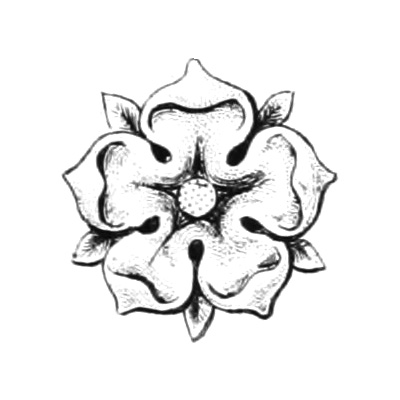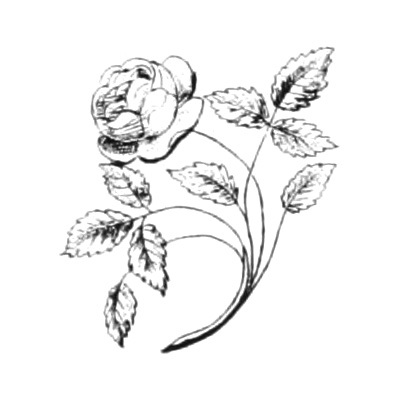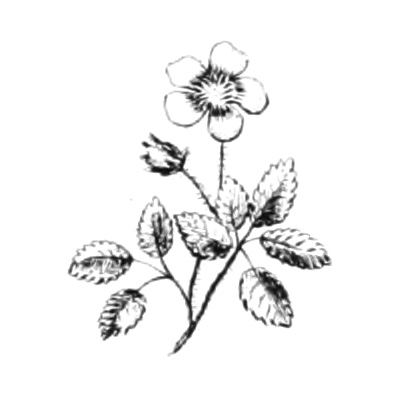- rose
Rose рус. роза
- фр. rose
- англ. rose
Цветок часто представленный в гербах и еще чаще в фигурных девизах. В древнейших гербовниках представлен тольку у ветвей семейства D'ARCYS. Изображается без стебля если только не указано, что роза «stalked» или «slipped». Геральдическая роза имеет пять лепестков, как на приведённом примере, но встречаются примере шести и четырёх лепестковых роз. Поименование шипов (barbs) - пяти листков чашечки(calyx), и семенника (central seeds) предполагает их зелёную и золотую/жёлтую окраску соотв. В системе понижающих меток соответствует седьмой ветви/дому. Нередко образуют венки (chaplet, см.), иногда коронуются (crowned).
- «Ermine, a rose gules, barbed and seeded proper» – BEVERLEY, Yorkshire.
- «Philip DARCY, d'argent a trois roses de goules» – Roll, temp. HEN. III.
- «Sire Robert DARCY, de argent a iij roses de goules od la bordure endente de sable» – Roll, temp. ED. II.
- «Sire Johan DARCY, de argent a un escuchon de sable od les rosettes de goules assis en la manere de bordure» – Ibid.
- «Sire Felyp DARCI, de argent a iij roses de goules» – Roll, temp. ED. II.
- «Sire William de CONSINGTONE, de azure a iij roses de or» – Ibid.
- «Monsire de ROSTLES, gules vi roses argent» – Roll, temp. ED. III.
- «Argent, on a bend azure three roses of the first» – CAREY, co. Oxford.
- «Or, a stag trippant azure on a chief of the last three roses argent» – FRUID, Scotland.
- «Argent, a cross engrailed gules between four mullets azure, on a chief or three damask roses of the second seeded gold barbed vert» – ALLGOOD, Nunwick, Northumberland.
- «Argent, a chevron sable between three roses gules slipped vert» – Nicholas WEST, Bp of Ely, 1515-33.
- «Argent, on a fesse vert between three damask roses barbed and seeded proper four ermine spots of the field» – WILLAUME, Tingrave, co. Bedford; granted 1767.
- «Argent, on a mount vert three heraldic roses gules stalked and leaved proper» – Dr.PEARCE, Dean of ELy.
Также встречается двойная роза, когда одна, помещается в центр другой, нередко имеющие разную окраску – белая в красной или наоборот. Термин «розетка» (rosette) испоьзуется лишь когда их несколько..
- «Azure, a saltire argent charged in the centre with a double rose gules» – OPPIN, Saxony.
- «Argent, a cross gules; in the dexter canton a dagger[probably meant for the sword of S.Paul] of the second; on a chief azure a double rose red and white barbed vert between two fleurs-de-lis or» – CHRIST'S HOSPITAL, London.
- Symon FRESEL, de cele gent
- Le ot noire а rosettes de argent
- Roll of Carlaverock.
Ветви розы (rose branches), побеги (slips) и листья (leaves) иногда используются самостоятельно. В одном древнем примере обнаруживается фраза «3 rosers».
- «Argent, two bars azure, over all a lion rampant or, holding in the dexter paw a rose branch gules» – TUDMAN.
- «Argent, on a mount vert three rose sprigs, the roses gules, the leaves and stalks proper» – ROSECREEG, Cornwall.
- «Argent, a rose and thistle conjoined paleways proper» – ASHTON.
- «Or, a rose leaf in bend sinister vert» – BENDLISE.
- «Gules, a chevron argent between three rose leaves of the second(another, or)» – Sir John ROSE.
- «Le Counte de RAMPSUILE dor a treis rosers; sur chekune roser une rose; chekune roser verte» – Roll, temp. HEN. III. (In another copy, possibly of the same original Roll, «Le Countee de RUMMESVILLE, dor trois roses [c]harges ove 3 roses vert.»)
Использование розы как политического символа можно проследить в войне домов Йорка и Ланкастера, первые пользовались белой розой, а их противники – красной, которые нередко описываются соотв как роза Йорка и роза Ланкастера. Говорят, что первыми их восприняли John of Gaunt, герцог Ланкастер и его брат Эдмунд, герцог Йорк (Edmund). Обе розы иногда окружены лучами, и описывались как «en soleil», позже часто соединялись.
- «A red rose en soleil» – Badge of Lancaster.
- «A white rose en soleil» – Ditto of York.
- «Red and white rose quarterly» – Ditto of House of TUDOR.
Один из фигурных девизов Екатерины Арагонской (Katherine of ARRAGON), см. в ст. Pomegranate, представлена роза; другая – у Katherine PARR, но в обоих случаях только в таком виде, как на иллюстрации.
- «A pomegranate burst open conjoined with a red and white rose one within the other» – Badge of Katherine of ARRAGON.
- «A maiden royally crowned proper, crined and vested or, conjoined to a part of a triple rose red, white, and red» – Badge of Katherine PARR.
Позднее королева Мэри (Queen MARY) приняла фигурный девиз в виде розы, но далее роза становится бэджем Стюартов, а позднее увенчивается короной.
- «A dexter half of a double rose, gules and argent, barbed and seeded proper, impaled with a semicircle per pale vert and azure, therein a sheaf of arrows or, armed and feathered of the second, and tied together with a tasselled cord, forming a knot of the first; the whole rayonnant, and ensigned with a royal crown without arches proper» – Badge of Queen MARY.
- «The two roses united one within the other royally crowned» – Badge of the House of STUART.
[parc]




